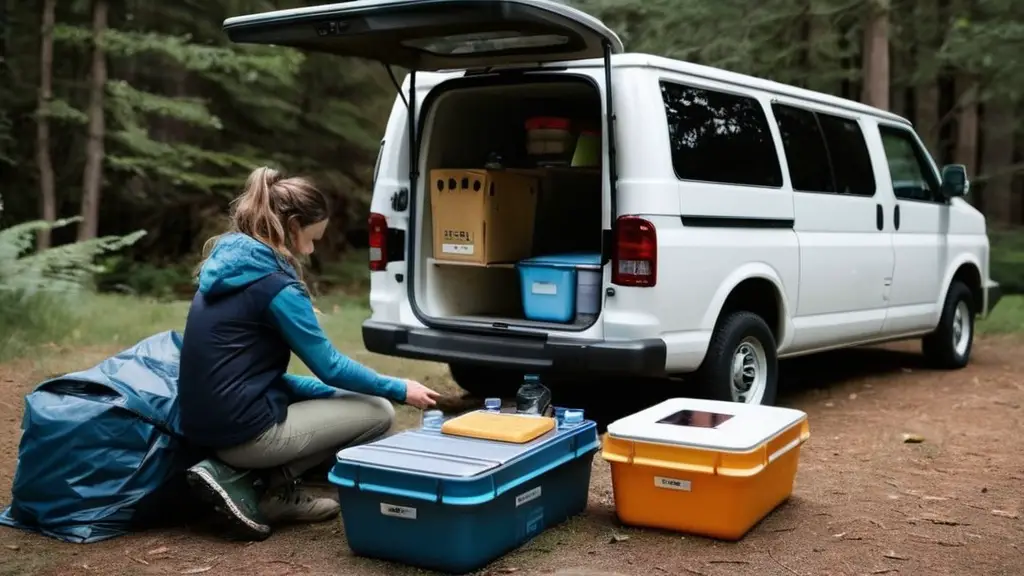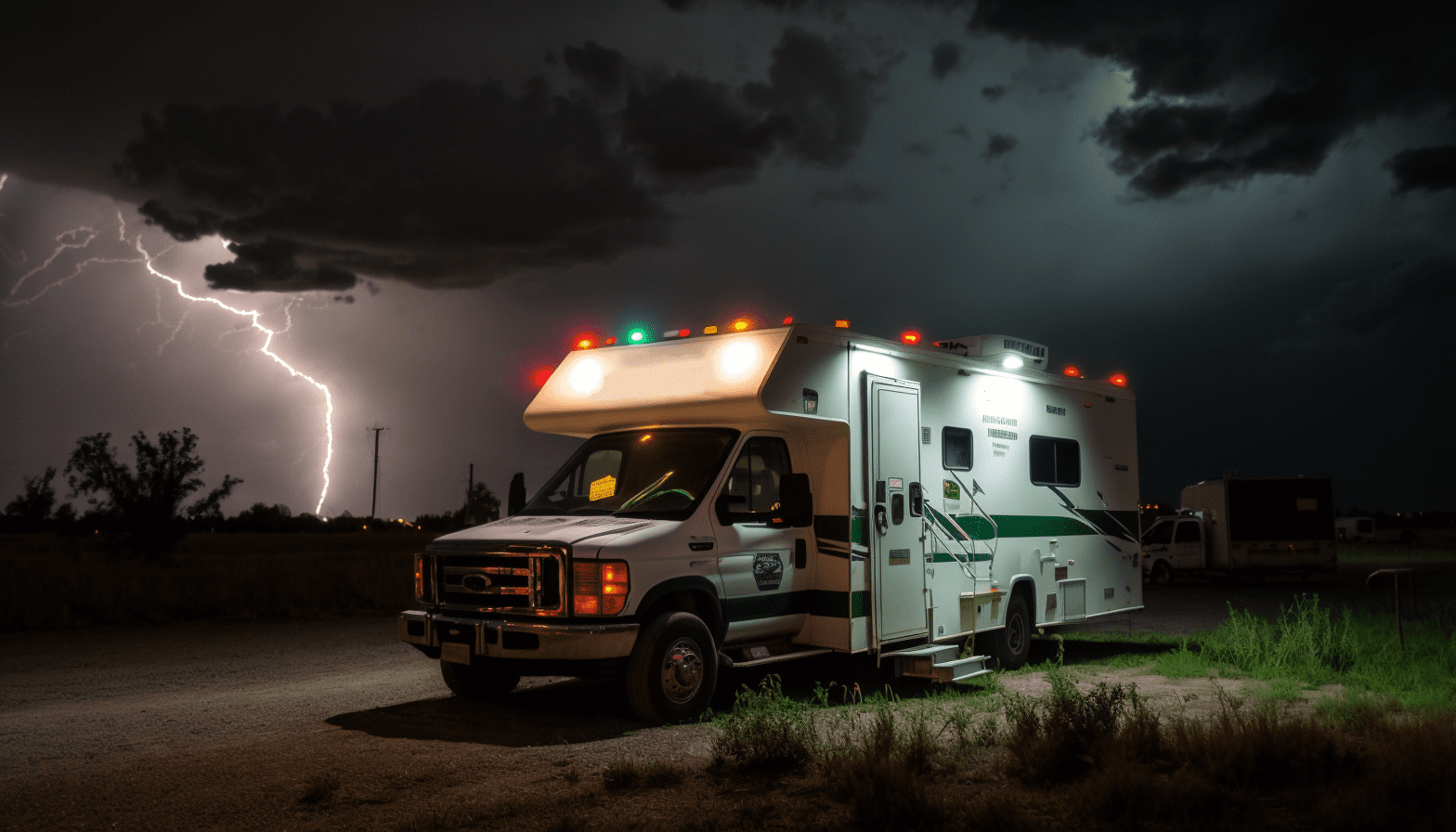If you’ve ever considered living the RV life but were worried about staying connected to the internet, don’t fret! It’s easier than you think. In this article, we’ll break down the simple steps for RV-ers to stay connected to the internet so they can keep up with their email, social media accounts, and streaming services. Whether you’re a full-time digital nomad or just want to take your digital devices on the road for vacation, we’ll show you how easy it is to stay connected while living in an RV. So, let’s get started!
Staying connected while living in an RV doesn’t have to be complicated. With today’s technology, all you need is a strong signal and reliable internet connection and you’re good to go. There are plenty of options available, from mobile hot spots and satellite dishes to fiber-optic cables and wireless routers. We’ll show you which one is best for your situation so that you can get online without any hassles or frustrations.
Finally, we’ll discuss some of the safety precautions that come along with using public Wi-Fi networks while traveling in an RV. From password security tips to data encryption settings, we’ll make sure that your internet connection is safe and secure no matter where you roam. So if connecting to the world wide web is important for your lifestyle, then read on as we explore how easy it is stay connected while living in an RV!
Table of Contents
Understanding Your Connectivity Options
Living in an RV can make staying connected to the internet difficult, but it doesn’t have to be. There are a few different options you can use to stay connected while on the road. Knowing and understanding these options will help you decide which one is best for your situation and budget.
The first option is using a mobile hotspot device or MiFi, which is a small device that creates a Wi-Fi connection with your cell phone’s data plan. This is an affordable choice if you already have a data plan and don’t use too much data each month. However, if you do use a lot of data this may not be the best option since most plans cap usage at certain amounts.
The second option is satellite internet service, which requires installation of special equipment on your RV roof. This type of service is more expensive than others, however it provides reliable high speed internet access no matter where you are in the country. It’s also ideal for those who need more bandwidth than what a mobile hotspot has available.
Finally, another option for staying connected while living in an RV is through public Wi-Fi hotspots or campgrounds with Wi-Fi services available for their guests. This can be unreliable since signals can vary from place to place and the speeds may not always be fast enough for streaming media or downloading large files. However, it’s often free or very cheap so it’s worth considering if other options aren’t available or too expensive for your budget.
Basic Equipment For RV Internet Connectivity
When living in an RV, having access to the internet is essential. To stay connected while on the road, there are a few basic pieces of equipment you’ll need. First, you’ll need a mobile router or hotspot device. This device will provide you with a wireless connection that can be shared among multiple devices in your RV. You’ll also need an antenna to pick up local signals and boost your internet signal strength. Finally, you’ll likely want to invest in a data plan from your cellular carrier so that you can access the internet anywhere.
The first step is to choose and install an antenna. Depending on where you’re located, you may be able to use a rooftop antenna for better reception, or an omnidirectional antenna if there are no obstructions around your RV. Once the antenna is installed, connect it to your mobile router or hotspot device and configure it accordingly. You may also want to look into using external antennas for better reception and speeds.
Finally, once all of your equipment is set up and ready to go, be sure to sign up for a data plan with your cell phone provider so you have internet access wherever you go. Be sure to research different plans available before signing up so that you get the best deal possible for what meets your needs. With all of this taken care of, you can now enjoy staying connected while living in an RV!
Mobile Broadband Services
Mobile broadband services offer an effective solution for RVers who need to stay connected to the internet while on the move. This type of service utilizes cellular internet networks, allowing customers to access the internet from any location that has cell signal. It’s an excellent option for those who don’t have consistent access to Wi-Fi hotspots and need a more reliable connection.
The first step for using mobile broadband is to purchase an unlimited data plan from a mobile internet solution provider such as T-Mobile (AT&T and Verizon do not offer an unlimited plan as of this writing). These plans offer varying levels of data at different prices, so it’s important to choose one that fits your needs and budget. Be sure and refer to the coverage maps for each. Some providers also offer special packages specifically tailored for RVers, which can provide additional savings and benefits.
Once you’ve purchased your plan, you’ll need to install the necessary hardware in your RV. This generally includes an antenna that connects to your router or modem and then extends out of your vehicle’s roof or window. The external antenna will capture the signal from nearby cell towers and transmit it through your router or modem as cellular hotspots, allowing you access to the internet anywhere within range of those networks.

With mobile broadband services, RVers can enjoy reliable internet access no matter where their travels take them. Whether they’re just taking a weekend trip across town or touring around the country for months at a time, they can easily stay connected without having to worry about finding Wi-Fi hotspots along the way.
Wi-Fi Hotspots And Networks
Moving on from mobile broadband services, Wi-Fi hotspots and networks can be an ideal way to stay connected to the internet while living in an RV. These are wireless networks that provide internet access to users within range of the signal. Hotspots can be found in many public locations such as libraries, airports, hotels, cafes and restaurants. You can also find them at some campgrounds or RV and national parks, making them quite convenient for those who live in their RV’s full time.
Another option is to create your own Wi-Fi network using a router or modem. This will allow you to access the internet wherever you are, as long as there is an available WiFi signal. You’ll need to purchase the appropriate equipment and ensure it’s compatible with your RV’s electrical system before setting up the network. Once everything is setup correctly, you can easily connect your laptop or tablet to the network and start browsing the web!
If you’re planning on travelling frequently with your RV, then having both mobile broadband service and a Wi-Fi hotspot/network set up will give you more options when it comes to staying connected online. You’ll have greater flexibility and be able to choose which connection suits you best depending on where you’re located at any given time. With either of these internet solutions, you’ll be able to keep in touch with family, friends and work no matter where life takes you!
Network Extenders And Boosters
Network extenders and boosters are good options for those looking to stay connected while living in an RV. They can help extend the range of a wireless connection, allowing users to access the internet when they’re far away from the source of their signal. These devices are often easy to install and require little setup or technical know-how. They also don’t take up much space, making them perfect for RVers who need to maximize their limited storage space.
Before purchasing an extender or booster, it is advisable to conduct some research as there are various models available. It’s important to consider factors such as the size of your RV, how many people will be using the network, and how far away you’ll be from a reliable signal source. Once you’ve determined your needs, you can find an appropriate model that suits them.
Overall, network extenders and boosters can be helpful tools for those looking to stay connected while living in an RV. They can provide reliable internet access even when you’re far away from a signal source, helping make your adventures even more enjoyable. If you’re looking for a way to stay connected on the road, these devices may be worth considering.
Satellite Internet Providers
For RVers who need to stay connected while on the road, satellite internet providers are a viable option. With satellite internet, you can get reliable and fast internet speeds no matter where you are located. The main benefit of using a satellite provider is that you can access the internet from almost any location, including remote areas with no existing wired or wireless networks. Additionally, satellite internet can be used in areas that experience extreme weather conditions or have poor cellular coverage. You MUST have a clear view of the sky, though.
When selecting a satellite internet provider, it’s important to consider features such as download speeds, data limits, and monthly fees. Some of the most popular providers offer plans with speeds up to 25 Mbps for downloads and 3 Mbps for uploads. These plans come with generous data caps so you won’t have to worry about running out of data during your travels. In addition, many providers offer discounts for long-term contracts or loyalty rewards for customers who remain with them for an extended period of time.
Choosing a reliable satellite internet provider can help ensure that you stay connected while living in an RV. It’s important to compare different providers and plans before making your decision to make sure that you find the best option for your needs and budget.
Public Wi-Fi Access Points
Public Wi-Fi access points are useful for RVers to stay connected to the internet. Many local businesses, libraries and parks offer free wireless networks for their customers or visitors. You can also ask around your RV park if any of the other RVs have a Wi-Fi connection available. If you’re willing to pay a fee, there are many public access points that offer broadband services as well.
If you’re out in rural areas, you may find it difficult to locate public Wi-Fi spots. But don’t worry; you still have other options available to keep connected online. Satellite Internet is probably one of the best solutions for RVers who live far away from urban centers. With satellite Internet, all you need is a satellite dish mounted on your RV and an internet service provider subscription.
For maximum flexibility and convenience while traveling, consider investing in a mobile hotspot device or USB modem. This way, you’ll be able to access the internet anytime and anywhere with just a few clicks of your mouse – no matter where your RV takes you!
Regardless of which option you choose, staying connected while living in an RV doesn’t have to be difficult or expensive!
Tips To Maximize Connection Strength And Speed
While having access to public Wi-Fi is great, it’s not always the strongest or most reliable connection. Fortunately, there are steps you can take to maximize your connection strength and speed while living in an RV.
The first tip is to use a signal amplifier or extender. This tool will amplify or extend your existing signal, allowing you to get the most out of it. You’ll also want to make sure that you position your router in a central location so that it can reach all parts of your RV. If you can, place it near a window for better reception. Additionally, if possible, try connecting with an ethernet cable instead of relying solely on Wi-Fi as this will provide a stronger connection.
Lastly, you may want to consider switching providers if the connection speed is slow in certain areas. There are many different providers available and some may offer faster speeds than others depending on where you’re located. Shop around for the best deal and be sure to read reviews from other people who have used the provider before making a final decision.
Cost Considerations
Living in an RV while staying connected to the internet can be expensive. Before committing to a plan, you should consider how much bandwidth you will need, what type of connection is available in your area, and how much you are willing to pay for the services.
When considering cost, take into account data limits and overage fees. Many mobile internet plans have monthly or daily data caps that can quickly add up if not managed properly. If you exceed your limit, you may be charged an additional fee per gigabyte of usage. Additionally, many providers charge higher rates for peak times rather than off-peak hours.
Finally, look into bundle deals that combine WiFi access with other types of entertainment such as TV streaming services. This can help save money by bundling multiple services into one package. By doing research ahead of time, it is possible to find a plan that fits your needs without breaking the bank.
Security Best Practices
While living in an RV, you can stay connected to the internet, but it’s important to take security measures so that your connection remains safe. By following the steps outlined below, you can ensure that your connection is secure and that you are protected from potential cyber threats.
First, it’s important to make sure that you have a secure wireless router. This router should be password-protected and encrypted with a strong encryption protocol such as WPA2 or WPA3. The stronger your encryption protocol, the better protection you will have from malicious actors. Additionally, make sure that you change your router’s password frequently and use unique passwords for each device connected to the network.
Another key step is to keep all of your devices updated with the latest software and security patches. This includes not only your computer but also any mobile devices or tablets that are connected to the network. Outdated software can contain vulnerabilities which malicious actors can exploit, so it is important to stay up-to-date on security patches in order to protect yourself from these threats.

Finally, it’s also recommended that you use a virtual private network (VPN) when connecting to public networks or Wi-Fi hotspots. A VPN encrypts all of your traffic so that no one else can see it while you are online, which makes it much harder for malicious actors to gain access to sensitive information like financial data or passwords. Additionally, using a VPN will help hide your IP address from anyone trying to track or monitor your activity online. I personally use SurfShark VPN on all my devices. Check out their service here!
By taking these simple steps, you can ensure that your internet connection remains safe and secure while living in an RV.
Frequently Asked Questions
Is It Possible To Connect Multiple Devices To The Same RV Internet Connection?
Staying connected to the internet while living in an RV can be a challenge. However, it is possible to connect multiple devices to the same RV internet connection, making it much easier for RV dwellers to get online. This article will explore the possibilities of connecting multiple devices to the same RV internet connection, as well as other methods that can help RV owners stay connected.
When looking into how to connect multiple devices to the same RV internet connection, there are a few things to consider. First, you’ll need a modem or router that’s compatible with your particular type of connection. You’ll also want to be sure that your device has enough ports for all of your gadgets, and that it has an adequate Wi-Fi signal range for your needs. Additionally, you should make sure that your device is capable of handling multiple connections at once, and not just one or two. Once you’ve got these components sorted out, you’re ready to start connecting multiple devices to the same RV internet connection.
Once everything is set up and running smoothly, there are some tips and tricks for getting the most out of your RV internet connection. For example, if you’re using an LTE router or modem with an antenna attached, try repositioning it in different locations around your vehicle until you find a spot where it gets optimal reception. Additionally, if you’re using Wi-Fi hotspots at campgrounds or other public places, be sure to turn off any unnecessary applications on your device so as not to drain its battery power too quickly. Finally, make sure that any security settings on both your device and router are enabled so that no unauthorized users can access your network without permission.
Overall, connecting multiple devices on the same RV internet connection isn’t difficult if done correctly and equipped with all necessary equipment beforehand. With proper planning and preparation before setting out on an RV adventure makes staying connected much easier than expected; allowing travelers more time enjoying their journey instead of worrying about technical issues!
Are There Any Additional Fees For Using Public Wi-Fi Access Points?
When living in an RV, it is important to know if there are any additional fees for using public Wi-Fi access points. This is especially true when connecting multiple devices to the same RV internet connection. Fortunately, most public Wi-Fi access points are free to use, but there may be certain locations that require payment or subscription fees.
For example, some hotels and libraries may require a fee for access to their Wi-Fi networks. Additionally, some campgrounds and RV parks may also require a fee for the use of their Wi-Fi networks. It’s important to research the fees associated with public Wi-Fi access points before using them.
When traveling in an RV, it’s best to look into other options for staying connected to the internet. For example, many cell phone providers offer mobile hotspot plans that can be used while on the road. These plans usually come with a monthly fee, but they can provide better coverage than public Wi-Fi access points in most cases. Additionally, satellite internet connections can be installed in RVs and are often more reliable than public Wi-Fi networks or mobile hotspots.
No matter which method you choose for staying connected while living in an RV, it’s important to remember that there may be additional fees associated with certain services or locations. Be sure to research these potential fees before signing up for any service or using any public Wi-Fi network so that you can avoid unexpected costs down the line.
What Are The Differences Between Mobile Broadband Services And Wi-Fi Hotspots?
Staying connected to the internet while living in an RV is a challenge, with many different options available. Two common methods are mobile broadband services and Wi-Fi hotspots. It’s important to understand the differences between these two options when trying to choose the best option for your needs.
Mobile broadband services are provided by cellular networks and use cellular data plans instead of traditional wired connections. These plans often come with monthly service fees and data caps that can be exceeded if you’re not careful. On the upside, they offer a more reliable connection than Wi-Fi hotspots because they don’t depend on having access to an open network.
Wi-Fi hotspots, on the other hand, provide access to public networks that may be available in certain places such as coffee shops or restaurants. They generally don’t come with any additional costs aside from any purchases you make at the establishment where you’re accessing the Wi-Fi. However, this type of connection is less reliable than mobile broadband services because it relies on having access to an open network.
In order to determine which option is best for your needs, consider how much data you will need and how often you will be accessing the internet while living in an RV. Think about how reliable your connection needs to be and how much money you want to spend each month for internet access. Both mobile broadband services and Wi-Fi hotspots have their pros and cons, so it’s important to weigh them carefully before making a decision.
Can I Use A Network Extender Or Booster To Increase The Range Of My Rv Internet Connection?
Staying connected to the internet while living in an RV can be challenging, especially if you don’t have a reliable connection. One way to increase your range of mobile broadband services or Wi-Fi hotspots is by using a network extender or booster. But what exactly are network extenders and boosters and how do they work?
Network extenders, also known as repeaters, are devices that extend the coverage area of a wireless router. They receive the signal from a wireless router and then amplify it, allowing you to access the Internet even in places where the signal was weak before. Network boosters work similarly but instead of amplifying the signal, they create their own signal which is then sent out in all directions. This gives you extended coverage from one single source.
In order for these devices to work properly, they need to be set up correctly and placed within range of your existing router or modem. Once setup is complete, you should be able to access the internet from anywhere in your RV with an improved connection speed and quality compared to what you had before. It’s important to note that although these devices can increase your range and provide better overall coverage, they will not necessarily improve your download speeds or provide faster connections than what is available from your current service provider.
Network extenders and boosters can be great tools for improving your RV internet connection but it’s important to make sure you understand how they work before investing in one. With proper installation and setup, you can enjoy improved connections wherever you take your RV!
Is It Safe To Use Unsecured Public Wi-Fi Networks?
Staying connected to the internet is essential in today’s world. But when living in an RV, the question of safety becomes more important when it comes to using unsecured public Wi-Fi networks. In this article, we’ll discuss whether or not it is safe to rely on such networks for your RV internet connection.

Public Wi-Fi networks are commonly found in restaurants, coffee shops, libraries and other public places. These networks are convenient and don’t require any special setup or configurations. However, they also come with a set of risks that need to be considered before connecting to them. This is because these networks are often unsecured, meaning there is no encryption being used to protect your data from hackers and other malicious actors.
When using an unsecured network, your personal information such as passwords and credit card numbers could easily be exposed to those with malicious intent. Additionally, it’s possible for hackers to intercept traffic sent through the network and use it for their own purposes. Finally, connecting to an unsecured network can also put your devices at risk of being infected with malware or viruses that can further compromise your privacy and security.
The best way to stay safe while using a public Wi-Fi network is by using a Virtual Private Network (VPN). A VPN will encrypt all of your internet traffic before sending it over the network, which will make it much more difficult for anyone trying to intercept your data. Additionally, you should always make sure that you’re only visiting secure websites over the network; look for ‘https’ instead of ‘http’ at the beginning of any website URL before entering any sensitive information. By following these steps and utilizing a VPN service while on a public Wi-Fi connection, you can ensure that your data remains secure while living in an RV.
Conclusion
Living in an RV doesn’t mean you have to be disconnected from the internet. With a few simple steps, you can stay connected while on the road.
First, you’ll want to look into mobile broadband services or Wi-Fi hotspots to connect multiple devices. You may need to pay additional fees for public Wi-Fi access points, but it can be worth it for the convenience and speed of connection. Additionally, you can use a network extender or booster to increase the range of your RV internet connection if needed.
Finally, it’s important to remember that unsecured public Wi-Fi networks can potentially put your personal data at risk; however, with the right precautions, such as using a Virtual Private Network (VPN), you can enjoy secure connections when living in an RV. With these tips in mind, there’s no reason why you can’t stay connected while living the life of an RVer!




